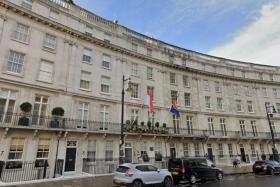'Harry Potter' author J.K. Rowling criticised for gender views
LONDON – British author JK Rowling, who scored stellar success with her series about the boy wizard Harry Potter, has courted controversy online and even death threats because of her outspoken views on gender identity.
Her position that biological sex is immutable has made her a darling of some feminists over the years, but incurred the wrath of transgender rights activists, who have called for her to be “cancelled”.
Rowling, 58, denies charges of transphobia that have tarnished the global success of the Harry Potter books, which have sold a staggering 600 million copies worldwide.
The latest row on social media blew up last week after the Scottish government in Edinburgh, where Rowling lives, passed a law criminalising hate speech, including against transgender people.
Rowling, who lives in the city with her second husband, on April 1 published a volley of messages about transgender women on the social media platform X, formerly Twitter, including several convicted of sexual offences.
“Obviously, the people mentioned in the above tweets aren’t women at all, but men, every last one of them,” she wrote.
The new legislation, she added, was “wide open” to abuse those wanting to silence advocates of women and girls’ single-sex spaces, and predatory men identifying as women.
“Freedom of speech and belief are at an end in Scotland if the accurate description of biological sex is deemed criminal,” she added, saying she welcomed arrest.
Police said complaints about the post were not criminal as the comments predictably triggered a firestorm, including from those for whom gender identity has become a “culture war” issue, such as Britain’s right-wing media and politicians.
The right-wing Daily Mail newspaper called Rowling a “hero”.
Criticism
Rowling’s transformation from almost universally popular children’s author to a hate figure for supporters of gender identity began back in 2018.
The writer liked a post on Twitter – the forerunner to X – by a woman who described transgender women as “men in dresses”.
She apologised after attracting criticism. Then in 2019, she publicly defended a woman who was sacked from her job after posting what were deemed to be transphobic tweets.
In 2020, Rowling also sarcastically replied to a description of “people who menstruate”, writing: “I’m sure there used to be a word for those people.
“Someone help me out. Wumben? Wimpund? Woomud?“
The comment earned her the rebuke of her Harry Potter prodigies, including Daniel Radcliffe who played the boy wizard in the film franchise of the books, who publicly disassociated himself from her.
Two years later, Rowling spoke out again when Scotland, which has some devolved legislative powers, proposed making it simpler for people to change their legal gender.
The UK government stepped in to block the bill going through at the devolved Scottish Parliament in Edinburgh.
Rowling calls herself a militant feminist, and has revealed how she had been a victim of domestic violence.
Women’s rights, she argued, could be threatened by some supporters of transgender rights and has spoken out about allowing transgender women to use changing rooms, toilets or prisons designated for women only.
Outspoken
Born on July 31, 1965 in the town of Chipping Sodbury in western England, Joanne Rowling began writing at an early age, telling stories she had dreamt up in her imagination.
After studying French, she became a translator at Amnesty International in London, then on a train trip to Manchester came up with the story of Harry Potter and his adventures at the Hogwarts School of Witchcraft and Wizardry.
She taught English in Portugal where she married her first husband and had a daughter.
She worked on the Potter books every morning before work, continuing after she returned home in 1995, and moved to Scotland following her divorce.
Rowling struggled and was receiving welfare payments when the publishing house Bloomsbury finally accepted her fantastical creation.
Within a few years she and Harry Potter were a global phenomenon, shifting more than 600 million copies in over 80 languages.
The eight films based on the books have raked in some US$8 billion, making Rowling a millionaire several times over.
Despite the furore about her views on gender identity, she admitted in the podcast “The Witch Trials of JK Rowling” that she was “not uncomfortable about getting off (her) pedestal” and speaking her mind. – AFP
Get The New Paper on your phone with the free TNP app. Download from the Apple App Store or Google Play Store now

